2021-2022学年外研版八年级英语下册Module 2 Experiences知识点讲解课件(共40张PPT)
文档属性
| 名称 | 2021-2022学年外研版八年级英语下册Module 2 Experiences知识点讲解课件(共40张PPT) |  | |
| 格式 | pptx | ||
| 文件大小 | 397.1KB | ||
| 资源类型 | 教案 | ||
| 版本资源 | 外研版 | ||
| 科目 | 英语 | ||
| 更新时间 | 2022-04-17 12:04:35 | ||
图片预览

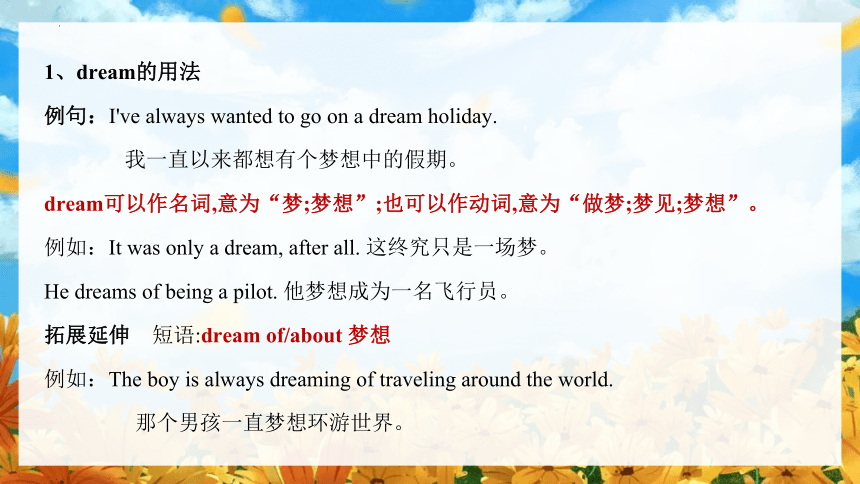
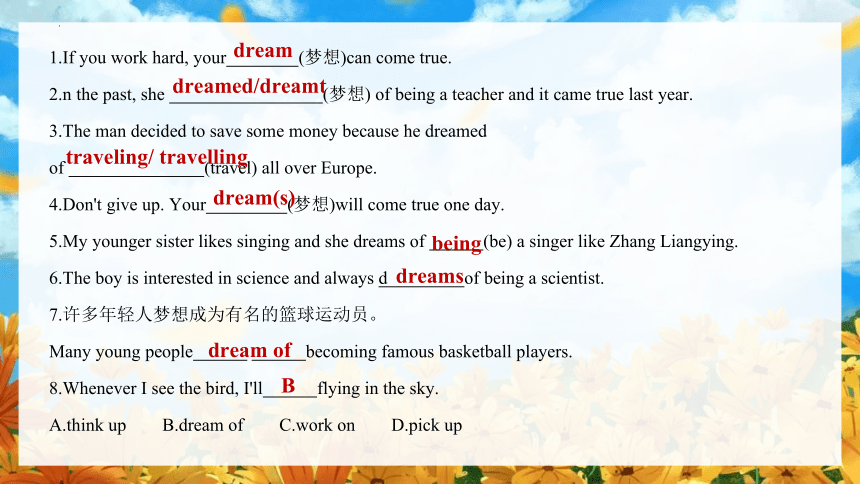
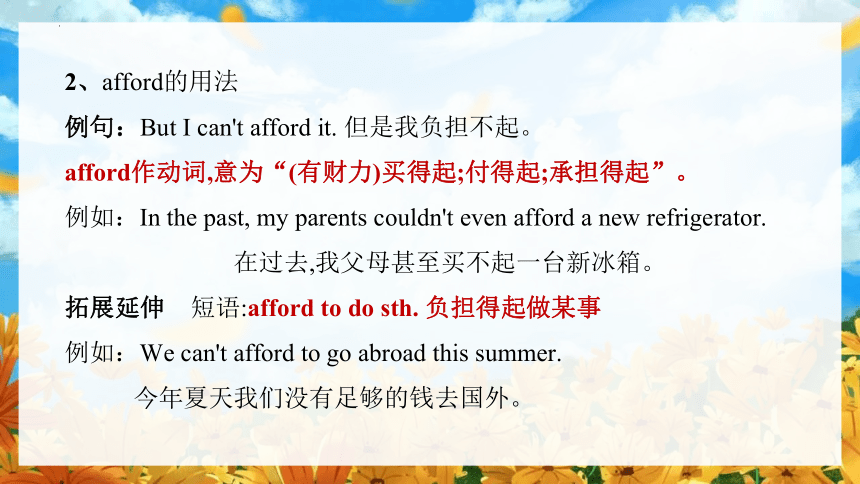
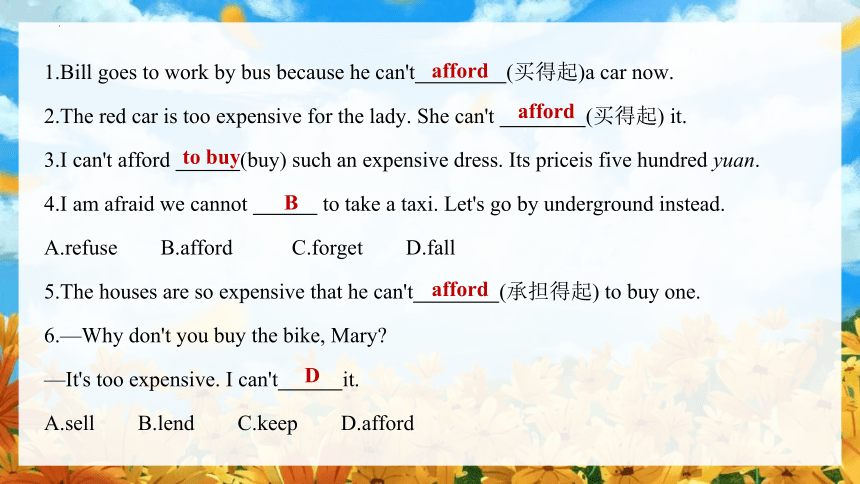
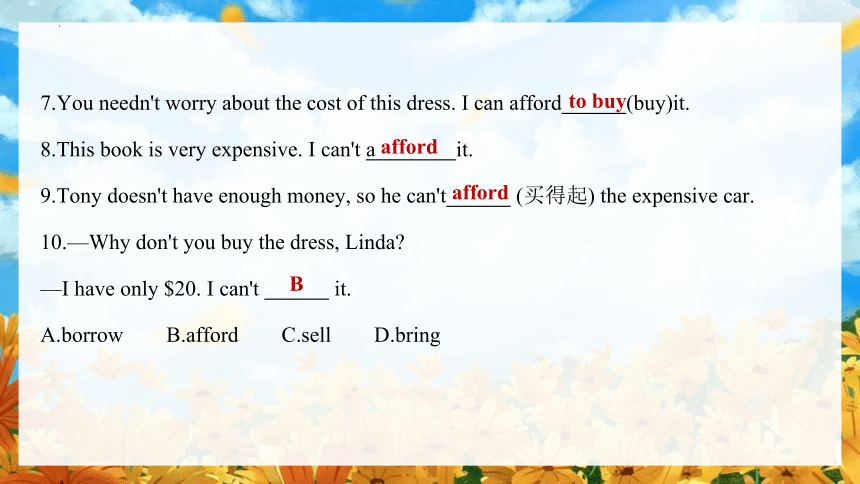
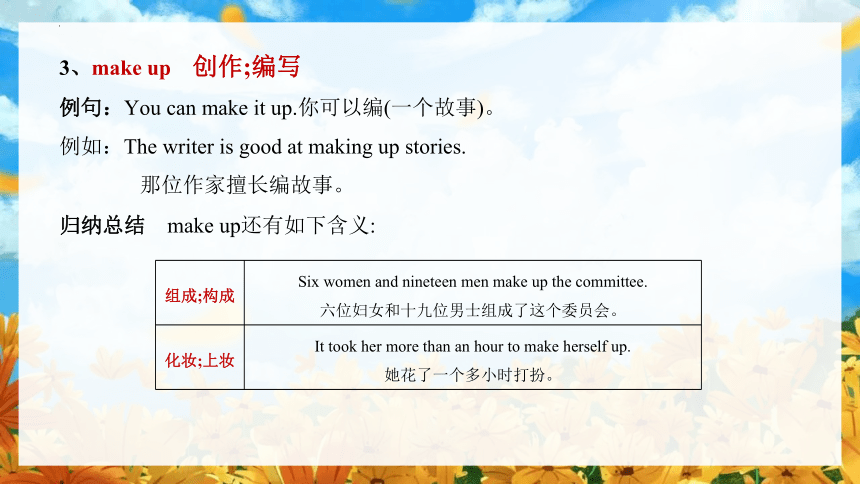
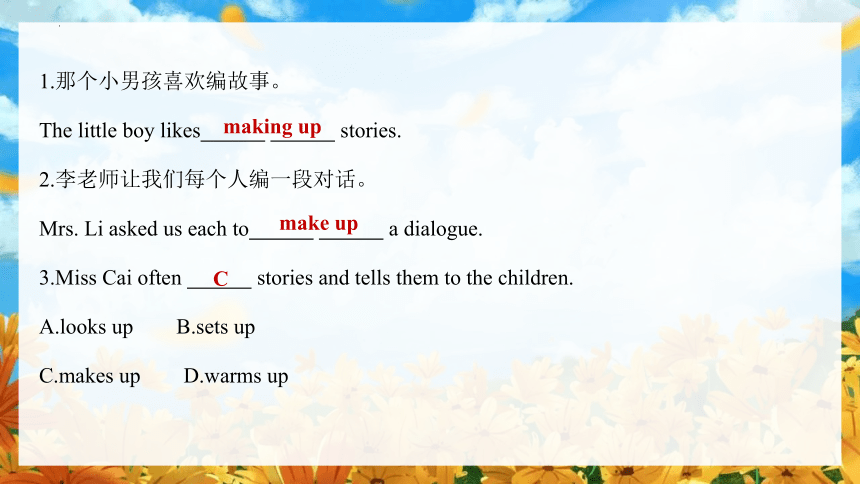

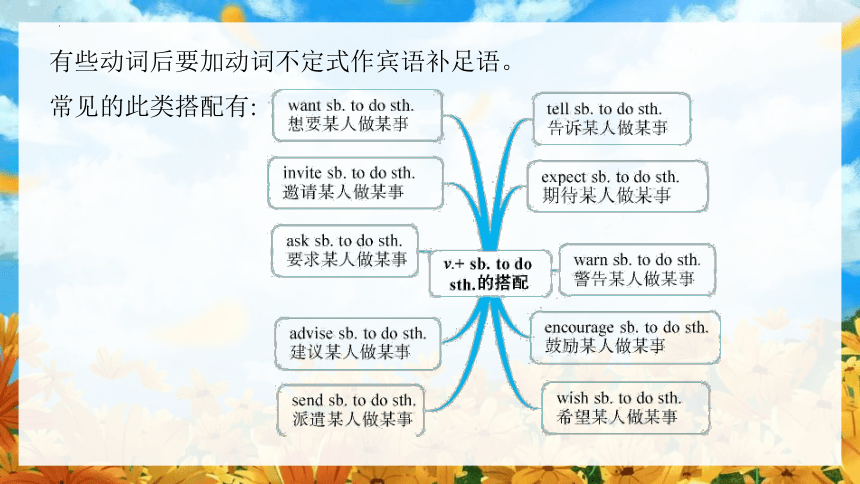
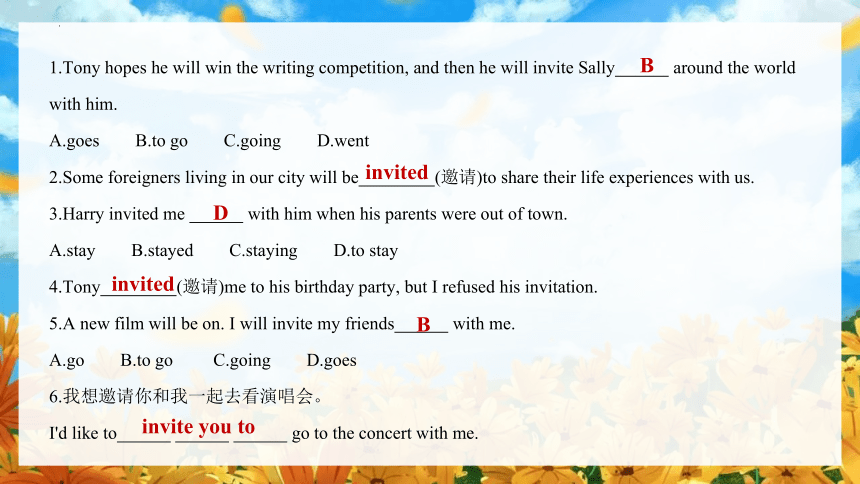
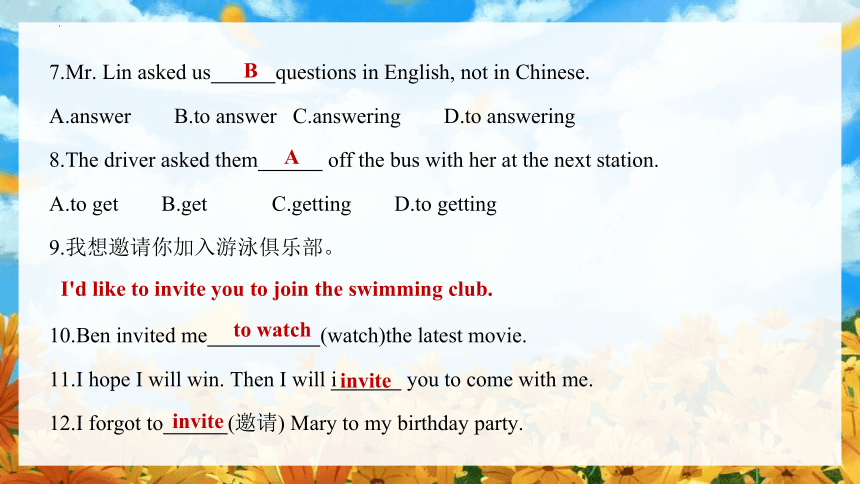
文档简介
(共40张PPT)
Module 2 Experiences
1、dream的用法
例句:I've always wanted to go on a dream holiday.
我一直以来都想有个梦想中的假期。
dream可以作名词,意为“梦;梦想”;也可以作动词,意为“做梦;梦见;梦想”。
例如:It was only a dream, after all. 这终究只是一场梦。
He dreams of being a pilot. 他梦想成为一名飞行员。
拓展延伸 短语:dream of/about 梦想
例如:The boy is always dreaming of traveling around the world.
那个男孩一直梦想环游世界。
1.If you work hard, your (梦想)can come true.
2.n the past, she (梦想) of being a teacher and it came true last year.
3.The man decided to save some money because he dreamed
of (travel) all over Europe.
4.Don't give up. Your (梦想)will come true one day.
5.My younger sister likes singing and she dreams of (be) a singer like Zhang Liangying.
6.The boy is interested in science and always d of being a scientist.
7.许多年轻人梦想成为有名的篮球运动员。
Many young people becoming famous basketball players.
8.Whenever I see the bird, I'll flying in the sky.
A.think up B.dream of C.work on D.pick up
dream
dreamed/dreamt
traveling/ travelling
dream(s)
being
dreams
dream of
B
2、afford的用法
例句:But I can't afford it. 但是我负担不起。
afford作动词,意为“(有财力)买得起;付得起;承担得起”。
例如:In the past, my parents couldn't even afford a new refrigerator.
在过去,我父母甚至买不起一台新冰箱。
拓展延伸 短语:afford to do sth. 负担得起做某事
例如:We can't afford to go abroad this summer.
今年夏天我们没有足够的钱去国外。
1.Bill goes to work by bus because he can't (买得起)a car now.
2.The red car is too expensive for the lady. She can't (买得起) it.
3.I can't afford (buy) such an expensive dress. Its priceis five hundred yuan.
4.I am afraid we cannot to take a taxi. Let's go by underground instead.
A.refuse B.afford C.forget D.fall
5.The houses are so expensive that he can't (承担得起) to buy one.
6.—Why don't you buy the bike, Mary
—It's too expensive. I can't it.
A.sell B.lend C.keep D.afford
afford
afford
afford
to buy
B
D
7.You needn't worry about the cost of this dress. I can afford (buy)it.
8.This book is very expensive. I can't a it.
9.Tony doesn't have enough money, so he can't (买得起) the expensive car.
10.—Why don't you buy the dress, Linda
—I have only $20. I can't it.
A.borrow B.afford C.sell D.bring
to buy
afford
afford
B
3、make up 创作;编写
例句:You can make it up.你可以编(一个故事)。
例如:The writer is good at making up stories.
那位作家擅长编故事。
归纳总结 make up还有如下含义:
组成;构成 Six women and nineteen men make up the committee.
六位妇女和十九位男士组成了这个委员会。
化妆;上妆 It took her more than an hour to make herself up.
她花了一个多小时打扮。
1.那个小男孩喜欢编故事。
The little boy likes stories.
2.李老师让我们每个人编一段对话。
Mrs. Li asked us each to a dialogue.
3.Miss Cai often stories and tells them to the children.
A.looks up B.sets up
C.makes up D.warms up
making up
make up
C
4、invite sb. to do sth. 邀请某人做某事
例句:I hope I will win,then I will invite you to come with me.
我希望我能赢,然后我会邀请你和我一起去。
例如:She invited me to play chess with her.
她邀请我和她一起下国际象棋。
归纳总结 派生词:invitation n. 邀请;请柬
例如:Thank you for your invitation. 谢谢你的邀请。
有些动词后要加动词不定式作宾语补足语。
常见的此类搭配有:
1.Tony hopes he will win the writing competition, and then he will invite Sally around the world
with him.
A.goes B.to go C.going D.went
2.Some foreigners living in our city will be (邀请)to share their life experiences with us.
3.Harry invited me with him when his parents were out of town.
A.stay B.stayed C.staying D.to stay
4.Tony (邀请)me to his birthday party, but I refused his invitation.
5.A new film will be on. I will invite my friends with me.
A.go B.to go C.going D.goes
6.我想邀请你和我一起去看演唱会。
I'd like to go to the concert with me.
B
D
B
invited
invited
invite you to
7.Mr. Lin asked us questions in English, not in Chinese.
A.answer B.to answer C.answering D.to answering
8.The driver asked them off the bus with her at the next station.
A.to get B.get C.getting D.to getting
9.我想邀请你加入游泳俱乐部。
10.Ben invited me (watch)the latest movie.
11.I hope I will win. Then I will i you to come with me.
12.I forgot to (邀请) Mary to my birthday party.
B
A
I'd like to invite you to join the swimming club.
to watch
invite
invite
13.他已经邀请我和他一起去看电影了。
He already me to go to the movies with him.
14.I invited her together, but she didn't agree.
A.sing B.singing C.to sing D.sings
15.—We will have a big basketball game next week, but we still need a player.
—Why don't you Bryan to join in the game He is fantastic.
A.invite B.teach C.warn
16.Linda asked me for her at the school gate, but I forgot all about it.
A.wait B.to wait C.waited D.waiting
17.It was raining. My father asked me a raincoat.
A.take B.takes C.took D.to take
has invited
C
A
B
D
5、过去分词(短语)作后置定语时的用法
例句:The first prize is only the book called Around the World in 80 Days!
一等奖仅仅是一本名叫《80天环游地球》的书!
本句中的called Around the World in 80 Days是过去分词短语,作后置定语
修饰the book。此处called表示“被称为”。当过去分词(短语)作后置定语时,动词与所修饰的词之间是被动关系。
例如:It is a bridge built by the local villagers.
这是一座由当地村民建造的桥。
1.Have you read the novel (call)The Old Man and the Sea
2.Do you like the novel (call)The Old Man and the Sea
3.I like the movie. The movie's name is The Pancake Man. (合并为一句)
I like the movie The Pancake Man.
4.I live in a city Tianjin.
A.name B.called C.naming D.call
5.我去图书馆借了一本老舍写的小说。
I went to the library and borrowed a novel Lao She.
6.—Tom, have you ever read the book A Tale of Two Cities by Charles Dickens
—Yes, I finished reading it last winter vacation.
A.wrote B.to write C.writing D.written
7.Smartphones by Huawei are getting more and more popular around the world.
A.made B.making C.to make
called
called
called/named
B
written by
D
A
6、“one of the+形容词最高级+可数名词复数”该结构是最高级的常考结构,
意为“最……的……之一”,注意该结构中要用可数名词的复数形式。
例句:At the moment, Mike and Clare are in Cairo in Egypt, one of the
biggest and busiest cities in Africa.
目前Mike和Clare在埃及的开罗——非洲最大、最繁忙的城市之一。
例如:I think basketball is one of the most exciting sports in the world.
我觉得篮球运动是世界上最令人兴奋的运动之一。
1.Shanghai is one of in the world.
A.the biggest cities B.biggest cities C.the biggest city D.bigger cities
2.—What do you think of your junior high school life
—I think it is one of periods in my life.
A.wonderful B.more wonderful C.much wonderful D.the most wonderful
3.Fishing is one of activities among the middle-aged people.
A.popular B.more popular C.most popular D.the most popular
4.Jenny is one of girls in our school.
A.creative B.the creative C.much creative D.the most creative
5.上海是中国最大的城市之一。
Shanghai is in China.
A
D
D
D
one of the biggest/largest cities
6.你知道中国是世界上最古老的国家之一吗
Do you know that China is one of the in the world
7.The hotel is very old. It's one of buildings in the city.
A.old B.older C.oldest D.the oldest
8.Tea is one of drinks in the world.
A.more popular B.the more popular
C.most popular D.the most popular
oldest countries
D
D
7、辨析win与beat
例句:
Which side won the football match 哪队赢了足球赛
We beat them by a score of 2 to 1.我们以2比1战胜了他们。
win 意为“赢得;获胜”,表示“赢得”比赛、竞赛、奖牌、奖杯等,
通常和match、competition、game、medal、prize等搭配
beat 意为“打败;战胜”,表示“打败”对手,
和表示人、球队、对手等的词搭配
1.The cute mouse always the cat in the cartoon Tom and Jerry.
A.wins B.beats C.beat
2.The boy runs very fast and we are sure that he can the running race.
A.win B.lose C.beat D.miss
3.—Did Tom the basketball match
—No, he didn't. Mike him.
A.win;beat B.beat;win C.won;beat
4.The first team (win) the basketball match yesterday afternoon.
B
A
A
won
8、辨析for example与such as
Many great men have risen from poverty, for example, Lincoln.
许多伟人从贫困中崛起,例如林肯。
I like to eat different kinds of fruits, such as apples, pears, and bananas.
我喜欢吃不同种类的水果,比如苹果、梨和香蕉。
for example 同for instance,用来举例说明某一论点或情况,一
般只举同类人或物中的“一个”为例
such as 表示“比如;例如”,一般用于列举同类人或事物
中的几个例子
1.许多学生有爱好,例如读书和绘画。
Many students have hobbies, reading and painting.
2.我想养一些宠物,比如兔子。
I want to keep some pets, ,rabbits.
3.我们的网店里有许多手机,比如,华为Mate 20。
There are lots of mobile phones in our online store, , Huawei Mate 20.
such as
for example
for example
9、辨析stop doing sth.与stop to do sth.
We'd better stop talking. 我们最好别说话了。
I stopped to tie my shoelaces.我停下来系鞋带。
stop doing sth. 表示“停下正在做的某件事”,
并不涉及另一件事
stop to do sth. 表示“停下来去做另一件事”,
侧重开始做另一件事
1. The child is crying. Please do something to make him .
A.stop to cry B.stop crying C.to stop crying
2.—Why not stop a rest
—Oh, it's so exciting that I can't stop the kite.
A.having;flying B.to have;to fly
C.having;to fly D.to have;flying
B
D
10、现在完成时(1)
(1)现在完成时的定义
现在完成时表示过去发生或已经完成的动作对现在造成的影响,也可表示
过去已经开始,一直延续到现在的动作或状态。
They have already swept the floor.他们已经扫过地了。
I have been a teacher for two years.我当老师已经两年了。
肯定句 主语+have/has+过去分词+其他
否定句 主语+haven't/hasn't+过去分词+其他
一般疑问句 Have/Has+主语+过去分词+其他
肯定答语 Yes,主语+have/has
否定答语 No,主语+haven't/hasn't
(2)现在完成时的构成
例句:
I have cleaned the room.我已经打扫过房间了。
I haven't cleaned the room.我还没有打扫房间。
—Have you cleaned the room 你打扫房间了吗
—Yes, I have.是的,我打扫过了。
—No, I haven't.不,我还没有打扫。
(3)过去分词的变化
大多数动词的过去分词的变化是规则的,即以-ed结尾。还有一部分动词的过去分词变化是不规则的。常见的有:
原形 过去式 过去分词
be was;were been
eat ate eaten
give gave given
see saw seen
think thought thought
drink drank drunk
fly flew flown
read read read
take took taken
write wrote written
1.We have cleaned Central Park. (改为一般疑问句)
Central Park
2.Tony has watched the movie.(改为一般疑问句,并作肯定回答)
— Tony the movie
—Yes, .
3.They have visited the Great Wall.(改为否定句)
They the Great Wall.
4.Have your parents bought birthday presents for you (作否定回答)
No, .
5.你沿丝绸之路旅游过吗
ever along the Silk Road
6.Wow! You dinner! Let's eat now.
A.cook B.are cooking C.will cook D.have cooked
Have you cleaned
Has watched
he has
haven't visited
they haven't
Have you traveled/travelled
D
7.I an invitation to the concert. I can't wait to go.
A.receive B.will receive C.was receiving D.have received
8.你曾经想要去环游世界吗
9.我已经给我妈妈寄过明信片了。
10.我以前从来没有见过她。
11.他还没有看过那场足球赛。
D
Have you ever wanted to travel around the world
I have already sent the postcard to my mother.
I have never seen her before.
He hasn't watched the football match yet.
12.—Do you still play basketball
—Oh, no. I it for the past two years.
A.haven't played B.didn't play C.won't play D.hadn't played
13.Don't return the video to Peter. I it.
A.don't watch B.won't watch C.haven't watched D.wasn't watching
14.I have climbed the Great Wall.(改为一般疑问句,并作肯定回答)
— the Great Wall
—Yes, .
15.I have had the noodles.(改为否定句)
I the noodles.
16.—It's ten years since we came here.
—How time flies! We in China for so long.
A.work B.worked C.will work D.have worked
A
C
Have you climbed
I have
haven't had
D
17.In the past few years, many schools the ways of doing morning exercises.
A.change B.changes C.will change D.have changed
18.我的父母为我做了那么多事情。
My parents for me.
19.从那时起,他就在那家工厂工作。
, he in that factory.
20.他从来没有参加过任何比赛。
He any competitions.
21.你做好晚饭了吗
dinner yet
22.你曾经参加过体育竞赛吗
you ever a sports competition
D
have done so many things
Since then has worked
has never entered
Have you cooked
Have entered
11、so far 表示“到目前为止”,是现在完成时的标志词。
例句: So far they have learnt to speak German, French, Chinese and Arabic.
到目前为止,他们已经学会了说德语、法语、汉语和阿拉伯语。
例如:We have learned about 3,000 words so far.
到目前为止,我们已经学了大约3,000个单词。
1.Mo Yan (write)many books so far.
2.So far I any news from her. I am really worried about her.
A.haven't got B.didn't get C.won't get D.don't get
3.Lily (finish)reading two hundred books so far.
4.——你为什么看起来不高兴
——因为到目前为止我还没有收到迈克的邀请。
—Why do you look unhappy
—Because I Mike's invitation so far.
has written
A
has finished
haven't received
5.到目前为止,我还没有收到莉莉的来信。
I haven't heard from Lily .
6.—Do you know the Color Run, a five-kilometer race
—Yes. So far it into quite a few cities in our country.
A.comes B.came C.has come
7.It is said that the number of forest parks in Guangdong to more than 1,000 so far.
A.increase B.increased C.has increased D.will increase
8.迄今为止,我已经给我的笔友写过五封电子邮件了。
I have written 5 emails to my pen friend.
so far
C
C
So far
12、have been to 表示“去过某地”,强调去过某地,且已经回来。
例句:They have been to many interesting places.
他们去过很多有趣的地方。
例如:They have been to Sanya three times.
他们去过三亚三次了。
辨析 have been to、have gone to和have been in
I have been to Nanjing twice.我已经去过南京两次了。
My father isn't at home. He has gone to London.我爸爸不在家。他去伦敦了。
They have been in the village for five days. 他们在那个村庄待了五天了。
have been to 去过某地,现在已经回来
have gone to 去某地了,现在仍然在某地或在途中
have been in 表示“在某地待了多长时间”,可以和时间段搭配
1.Mike and Clare Shanghai to enter a competition. They are coming back next week.
A.have gone to B.have been to
C.has gone to D.has been to
2.我去过海南岛两次了。
I Hainan Island twice.
3.—Frank, where is your father
—He isn't at home now. He New York.
A.has gone to B.has been to C.goes to
4.As an exchange student, Alan Qiqihar for one and a half years.
A.has been to B.has been in C.has gone to
A
have been to
A
B
5.—Lucy has to London. How can I get in touch with her
—Don't worry. She will phone you as soon as she there.
A.been;will get B.been;gets C.gone;will get D.gone;gets
6.—Hi, Tom! you ever the Bird's Nest
—Yes, I have. It's fantastic.
A.Have;been to B.Have;gone to C.Did;go to
7.—I want to return the book to Jack, but I can't find him.
—He the library. You can find him there.
A.has been to B.has gone to C.has left D.went to
8.—Hello! Could I speak to Lily
—Sorry, she is not in. She Shanghai.
A.have been to B.have gone to C.has been to D.has gone to
D
A
B
D
Module 2 Experiences
1、dream的用法
例句:I've always wanted to go on a dream holiday.
我一直以来都想有个梦想中的假期。
dream可以作名词,意为“梦;梦想”;也可以作动词,意为“做梦;梦见;梦想”。
例如:It was only a dream, after all. 这终究只是一场梦。
He dreams of being a pilot. 他梦想成为一名飞行员。
拓展延伸 短语:dream of/about 梦想
例如:The boy is always dreaming of traveling around the world.
那个男孩一直梦想环游世界。
1.If you work hard, your (梦想)can come true.
2.n the past, she (梦想) of being a teacher and it came true last year.
3.The man decided to save some money because he dreamed
of (travel) all over Europe.
4.Don't give up. Your (梦想)will come true one day.
5.My younger sister likes singing and she dreams of (be) a singer like Zhang Liangying.
6.The boy is interested in science and always d of being a scientist.
7.许多年轻人梦想成为有名的篮球运动员。
Many young people becoming famous basketball players.
8.Whenever I see the bird, I'll flying in the sky.
A.think up B.dream of C.work on D.pick up
dream
dreamed/dreamt
traveling/ travelling
dream(s)
being
dreams
dream of
B
2、afford的用法
例句:But I can't afford it. 但是我负担不起。
afford作动词,意为“(有财力)买得起;付得起;承担得起”。
例如:In the past, my parents couldn't even afford a new refrigerator.
在过去,我父母甚至买不起一台新冰箱。
拓展延伸 短语:afford to do sth. 负担得起做某事
例如:We can't afford to go abroad this summer.
今年夏天我们没有足够的钱去国外。
1.Bill goes to work by bus because he can't (买得起)a car now.
2.The red car is too expensive for the lady. She can't (买得起) it.
3.I can't afford (buy) such an expensive dress. Its priceis five hundred yuan.
4.I am afraid we cannot to take a taxi. Let's go by underground instead.
A.refuse B.afford C.forget D.fall
5.The houses are so expensive that he can't (承担得起) to buy one.
6.—Why don't you buy the bike, Mary
—It's too expensive. I can't it.
A.sell B.lend C.keep D.afford
afford
afford
afford
to buy
B
D
7.You needn't worry about the cost of this dress. I can afford (buy)it.
8.This book is very expensive. I can't a it.
9.Tony doesn't have enough money, so he can't (买得起) the expensive car.
10.—Why don't you buy the dress, Linda
—I have only $20. I can't it.
A.borrow B.afford C.sell D.bring
to buy
afford
afford
B
3、make up 创作;编写
例句:You can make it up.你可以编(一个故事)。
例如:The writer is good at making up stories.
那位作家擅长编故事。
归纳总结 make up还有如下含义:
组成;构成 Six women and nineteen men make up the committee.
六位妇女和十九位男士组成了这个委员会。
化妆;上妆 It took her more than an hour to make herself up.
她花了一个多小时打扮。
1.那个小男孩喜欢编故事。
The little boy likes stories.
2.李老师让我们每个人编一段对话。
Mrs. Li asked us each to a dialogue.
3.Miss Cai often stories and tells them to the children.
A.looks up B.sets up
C.makes up D.warms up
making up
make up
C
4、invite sb. to do sth. 邀请某人做某事
例句:I hope I will win,then I will invite you to come with me.
我希望我能赢,然后我会邀请你和我一起去。
例如:She invited me to play chess with her.
她邀请我和她一起下国际象棋。
归纳总结 派生词:invitation n. 邀请;请柬
例如:Thank you for your invitation. 谢谢你的邀请。
有些动词后要加动词不定式作宾语补足语。
常见的此类搭配有:
1.Tony hopes he will win the writing competition, and then he will invite Sally around the world
with him.
A.goes B.to go C.going D.went
2.Some foreigners living in our city will be (邀请)to share their life experiences with us.
3.Harry invited me with him when his parents were out of town.
A.stay B.stayed C.staying D.to stay
4.Tony (邀请)me to his birthday party, but I refused his invitation.
5.A new film will be on. I will invite my friends with me.
A.go B.to go C.going D.goes
6.我想邀请你和我一起去看演唱会。
I'd like to go to the concert with me.
B
D
B
invited
invited
invite you to
7.Mr. Lin asked us questions in English, not in Chinese.
A.answer B.to answer C.answering D.to answering
8.The driver asked them off the bus with her at the next station.
A.to get B.get C.getting D.to getting
9.我想邀请你加入游泳俱乐部。
10.Ben invited me (watch)the latest movie.
11.I hope I will win. Then I will i you to come with me.
12.I forgot to (邀请) Mary to my birthday party.
B
A
I'd like to invite you to join the swimming club.
to watch
invite
invite
13.他已经邀请我和他一起去看电影了。
He already me to go to the movies with him.
14.I invited her together, but she didn't agree.
A.sing B.singing C.to sing D.sings
15.—We will have a big basketball game next week, but we still need a player.
—Why don't you Bryan to join in the game He is fantastic.
A.invite B.teach C.warn
16.Linda asked me for her at the school gate, but I forgot all about it.
A.wait B.to wait C.waited D.waiting
17.It was raining. My father asked me a raincoat.
A.take B.takes C.took D.to take
has invited
C
A
B
D
5、过去分词(短语)作后置定语时的用法
例句:The first prize is only the book called Around the World in 80 Days!
一等奖仅仅是一本名叫《80天环游地球》的书!
本句中的called Around the World in 80 Days是过去分词短语,作后置定语
修饰the book。此处called表示“被称为”。当过去分词(短语)作后置定语时,动词与所修饰的词之间是被动关系。
例如:It is a bridge built by the local villagers.
这是一座由当地村民建造的桥。
1.Have you read the novel (call)The Old Man and the Sea
2.Do you like the novel (call)The Old Man and the Sea
3.I like the movie. The movie's name is The Pancake Man. (合并为一句)
I like the movie The Pancake Man.
4.I live in a city Tianjin.
A.name B.called C.naming D.call
5.我去图书馆借了一本老舍写的小说。
I went to the library and borrowed a novel Lao She.
6.—Tom, have you ever read the book A Tale of Two Cities by Charles Dickens
—Yes, I finished reading it last winter vacation.
A.wrote B.to write C.writing D.written
7.Smartphones by Huawei are getting more and more popular around the world.
A.made B.making C.to make
called
called
called/named
B
written by
D
A
6、“one of the+形容词最高级+可数名词复数”该结构是最高级的常考结构,
意为“最……的……之一”,注意该结构中要用可数名词的复数形式。
例句:At the moment, Mike and Clare are in Cairo in Egypt, one of the
biggest and busiest cities in Africa.
目前Mike和Clare在埃及的开罗——非洲最大、最繁忙的城市之一。
例如:I think basketball is one of the most exciting sports in the world.
我觉得篮球运动是世界上最令人兴奋的运动之一。
1.Shanghai is one of in the world.
A.the biggest cities B.biggest cities C.the biggest city D.bigger cities
2.—What do you think of your junior high school life
—I think it is one of periods in my life.
A.wonderful B.more wonderful C.much wonderful D.the most wonderful
3.Fishing is one of activities among the middle-aged people.
A.popular B.more popular C.most popular D.the most popular
4.Jenny is one of girls in our school.
A.creative B.the creative C.much creative D.the most creative
5.上海是中国最大的城市之一。
Shanghai is in China.
A
D
D
D
one of the biggest/largest cities
6.你知道中国是世界上最古老的国家之一吗
Do you know that China is one of the in the world
7.The hotel is very old. It's one of buildings in the city.
A.old B.older C.oldest D.the oldest
8.Tea is one of drinks in the world.
A.more popular B.the more popular
C.most popular D.the most popular
oldest countries
D
D
7、辨析win与beat
例句:
Which side won the football match 哪队赢了足球赛
We beat them by a score of 2 to 1.我们以2比1战胜了他们。
win 意为“赢得;获胜”,表示“赢得”比赛、竞赛、奖牌、奖杯等,
通常和match、competition、game、medal、prize等搭配
beat 意为“打败;战胜”,表示“打败”对手,
和表示人、球队、对手等的词搭配
1.The cute mouse always the cat in the cartoon Tom and Jerry.
A.wins B.beats C.beat
2.The boy runs very fast and we are sure that he can the running race.
A.win B.lose C.beat D.miss
3.—Did Tom the basketball match
—No, he didn't. Mike him.
A.win;beat B.beat;win C.won;beat
4.The first team (win) the basketball match yesterday afternoon.
B
A
A
won
8、辨析for example与such as
Many great men have risen from poverty, for example, Lincoln.
许多伟人从贫困中崛起,例如林肯。
I like to eat different kinds of fruits, such as apples, pears, and bananas.
我喜欢吃不同种类的水果,比如苹果、梨和香蕉。
for example 同for instance,用来举例说明某一论点或情况,一
般只举同类人或物中的“一个”为例
such as 表示“比如;例如”,一般用于列举同类人或事物
中的几个例子
1.许多学生有爱好,例如读书和绘画。
Many students have hobbies, reading and painting.
2.我想养一些宠物,比如兔子。
I want to keep some pets, ,rabbits.
3.我们的网店里有许多手机,比如,华为Mate 20。
There are lots of mobile phones in our online store, , Huawei Mate 20.
such as
for example
for example
9、辨析stop doing sth.与stop to do sth.
We'd better stop talking. 我们最好别说话了。
I stopped to tie my shoelaces.我停下来系鞋带。
stop doing sth. 表示“停下正在做的某件事”,
并不涉及另一件事
stop to do sth. 表示“停下来去做另一件事”,
侧重开始做另一件事
1. The child is crying. Please do something to make him .
A.stop to cry B.stop crying C.to stop crying
2.—Why not stop a rest
—Oh, it's so exciting that I can't stop the kite.
A.having;flying B.to have;to fly
C.having;to fly D.to have;flying
B
D
10、现在完成时(1)
(1)现在完成时的定义
现在完成时表示过去发生或已经完成的动作对现在造成的影响,也可表示
过去已经开始,一直延续到现在的动作或状态。
They have already swept the floor.他们已经扫过地了。
I have been a teacher for two years.我当老师已经两年了。
肯定句 主语+have/has+过去分词+其他
否定句 主语+haven't/hasn't+过去分词+其他
一般疑问句 Have/Has+主语+过去分词+其他
肯定答语 Yes,主语+have/has
否定答语 No,主语+haven't/hasn't
(2)现在完成时的构成
例句:
I have cleaned the room.我已经打扫过房间了。
I haven't cleaned the room.我还没有打扫房间。
—Have you cleaned the room 你打扫房间了吗
—Yes, I have.是的,我打扫过了。
—No, I haven't.不,我还没有打扫。
(3)过去分词的变化
大多数动词的过去分词的变化是规则的,即以-ed结尾。还有一部分动词的过去分词变化是不规则的。常见的有:
原形 过去式 过去分词
be was;were been
eat ate eaten
give gave given
see saw seen
think thought thought
drink drank drunk
fly flew flown
read read read
take took taken
write wrote written
1.We have cleaned Central Park. (改为一般疑问句)
Central Park
2.Tony has watched the movie.(改为一般疑问句,并作肯定回答)
— Tony the movie
—Yes, .
3.They have visited the Great Wall.(改为否定句)
They the Great Wall.
4.Have your parents bought birthday presents for you (作否定回答)
No, .
5.你沿丝绸之路旅游过吗
ever along the Silk Road
6.Wow! You dinner! Let's eat now.
A.cook B.are cooking C.will cook D.have cooked
Have you cleaned
Has watched
he has
haven't visited
they haven't
Have you traveled/travelled
D
7.I an invitation to the concert. I can't wait to go.
A.receive B.will receive C.was receiving D.have received
8.你曾经想要去环游世界吗
9.我已经给我妈妈寄过明信片了。
10.我以前从来没有见过她。
11.他还没有看过那场足球赛。
D
Have you ever wanted to travel around the world
I have already sent the postcard to my mother.
I have never seen her before.
He hasn't watched the football match yet.
12.—Do you still play basketball
—Oh, no. I it for the past two years.
A.haven't played B.didn't play C.won't play D.hadn't played
13.Don't return the video to Peter. I it.
A.don't watch B.won't watch C.haven't watched D.wasn't watching
14.I have climbed the Great Wall.(改为一般疑问句,并作肯定回答)
— the Great Wall
—Yes, .
15.I have had the noodles.(改为否定句)
I the noodles.
16.—It's ten years since we came here.
—How time flies! We in China for so long.
A.work B.worked C.will work D.have worked
A
C
Have you climbed
I have
haven't had
D
17.In the past few years, many schools the ways of doing morning exercises.
A.change B.changes C.will change D.have changed
18.我的父母为我做了那么多事情。
My parents for me.
19.从那时起,他就在那家工厂工作。
, he in that factory.
20.他从来没有参加过任何比赛。
He any competitions.
21.你做好晚饭了吗
dinner yet
22.你曾经参加过体育竞赛吗
you ever a sports competition
D
have done so many things
Since then has worked
has never entered
Have you cooked
Have entered
11、so far 表示“到目前为止”,是现在完成时的标志词。
例句: So far they have learnt to speak German, French, Chinese and Arabic.
到目前为止,他们已经学会了说德语、法语、汉语和阿拉伯语。
例如:We have learned about 3,000 words so far.
到目前为止,我们已经学了大约3,000个单词。
1.Mo Yan (write)many books so far.
2.So far I any news from her. I am really worried about her.
A.haven't got B.didn't get C.won't get D.don't get
3.Lily (finish)reading two hundred books so far.
4.——你为什么看起来不高兴
——因为到目前为止我还没有收到迈克的邀请。
—Why do you look unhappy
—Because I Mike's invitation so far.
has written
A
has finished
haven't received
5.到目前为止,我还没有收到莉莉的来信。
I haven't heard from Lily .
6.—Do you know the Color Run, a five-kilometer race
—Yes. So far it into quite a few cities in our country.
A.comes B.came C.has come
7.It is said that the number of forest parks in Guangdong to more than 1,000 so far.
A.increase B.increased C.has increased D.will increase
8.迄今为止,我已经给我的笔友写过五封电子邮件了。
I have written 5 emails to my pen friend.
so far
C
C
So far
12、have been to 表示“去过某地”,强调去过某地,且已经回来。
例句:They have been to many interesting places.
他们去过很多有趣的地方。
例如:They have been to Sanya three times.
他们去过三亚三次了。
辨析 have been to、have gone to和have been in
I have been to Nanjing twice.我已经去过南京两次了。
My father isn't at home. He has gone to London.我爸爸不在家。他去伦敦了。
They have been in the village for five days. 他们在那个村庄待了五天了。
have been to 去过某地,现在已经回来
have gone to 去某地了,现在仍然在某地或在途中
have been in 表示“在某地待了多长时间”,可以和时间段搭配
1.Mike and Clare Shanghai to enter a competition. They are coming back next week.
A.have gone to B.have been to
C.has gone to D.has been to
2.我去过海南岛两次了。
I Hainan Island twice.
3.—Frank, where is your father
—He isn't at home now. He New York.
A.has gone to B.has been to C.goes to
4.As an exchange student, Alan Qiqihar for one and a half years.
A.has been to B.has been in C.has gone to
A
have been to
A
B
5.—Lucy has to London. How can I get in touch with her
—Don't worry. She will phone you as soon as she there.
A.been;will get B.been;gets C.gone;will get D.gone;gets
6.—Hi, Tom! you ever the Bird's Nest
—Yes, I have. It's fantastic.
A.Have;been to B.Have;gone to C.Did;go to
7.—I want to return the book to Jack, but I can't find him.
—He the library. You can find him there.
A.has been to B.has gone to C.has left D.went to
8.—Hello! Could I speak to Lily
—Sorry, she is not in. She Shanghai.
A.have been to B.have gone to C.has been to D.has gone to
D
A
B
D
同课章节目录
- Module 1 Feelings and impressions
- Unit 1 It smells delicious.
- Unit 2 I feel nervous when I speak Chinese .
- Unit 3 Language in use
- Module 2 Experiences
- Unit 1 I've also entered lots of speaking competi
- Unit 2 They have seen the Pyramids.
- Unit 3 Language in use
- Module 3 Journey to space
- Unit 1 Has it arrived yet?
- Unit 2 We have not found life on any other planet
- Unit 3 Language in use
- Module 4 Seeing the docto
- Unit 1 I haven't done much exercise since I got m
- Unit 2 We have played football for a year now
- Unit 3 Language in use
- Module 5 Cartoons
- Unit 1 It's time to watch a cartoon.
- Unit 2 Tintin has been popular for over eighty yea
- Unit 3 Language in use
- Revision module A
- Module 6 Hobbies
- Unit 1 Do you collect anything ?
- Unit 2 Hobbies can make you grow as a person.
- Unit 3 Language in use
- Module 7 Summer in Los Angeles
- Unit 1 Please write to me and send me some photos
- Unit 2 Fill out a form and come to learn English
- Unit 3 Language in use
- Module 8 Time off
- Unit 1 I can hardly believe we are in the city ce
- Unit 2 We thought somebody was moving about
- Unit 3 Language in use
- Module 9 Friendship
- Unit 1 Could I ask if you've mentioned this to he
- Unit 2 I believe that the world is what you think
- Unit 3 Language in use
- Module 10 On the radio
- Unit 1 I hope that you can join us one day
- Unit 2 It seemed that they were speaking to me in
- Unit 3 Language in use
- Revision module B
